情态动词复习课件
图片预览




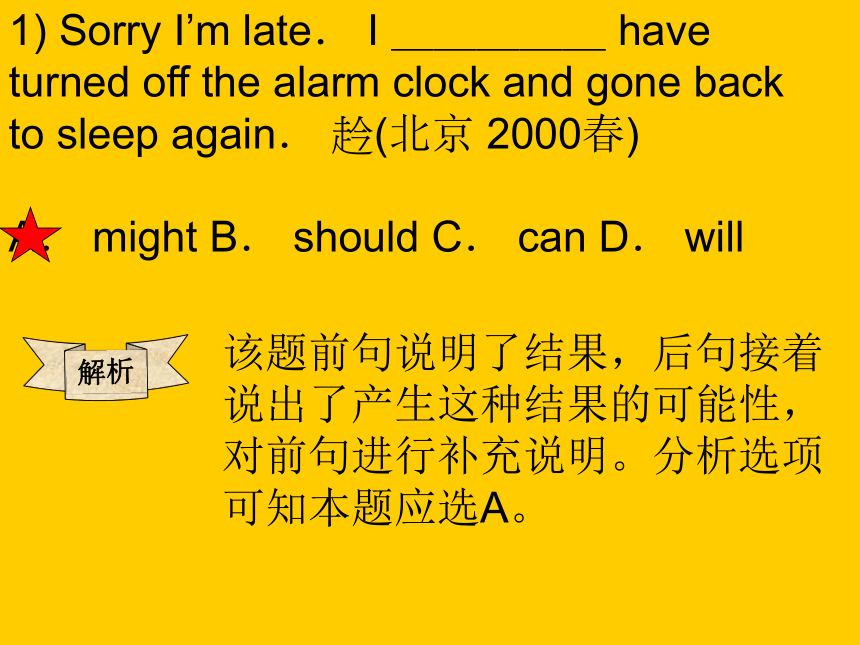
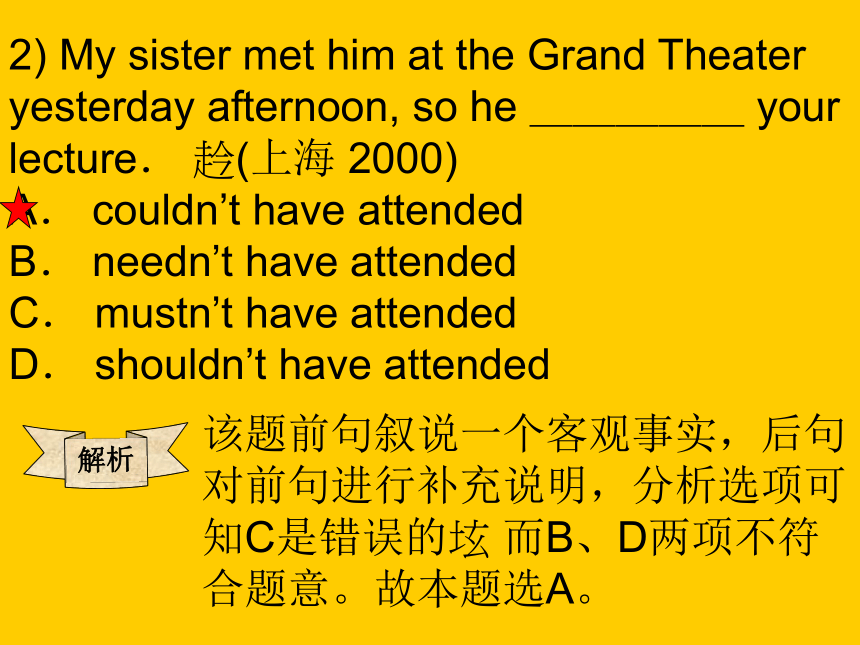


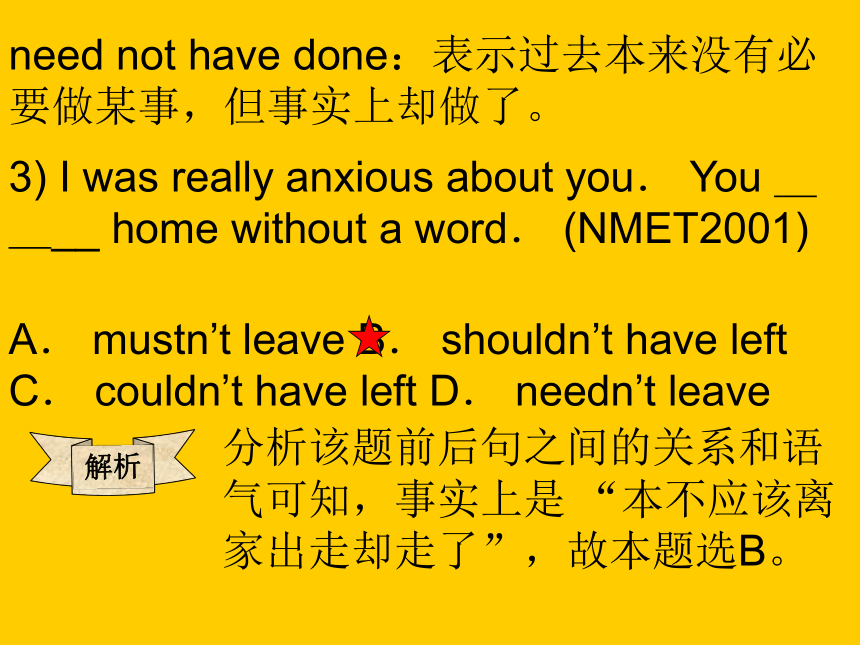
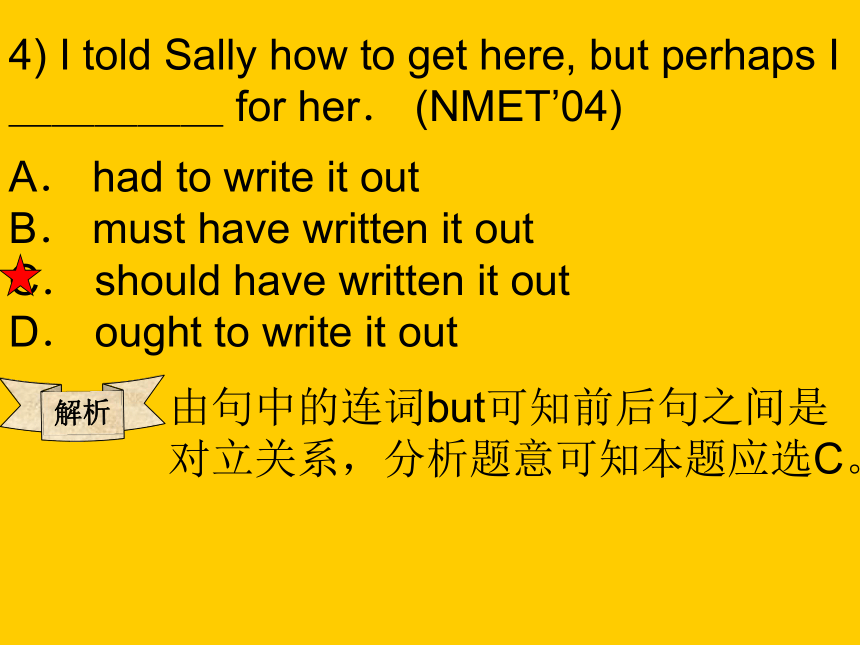
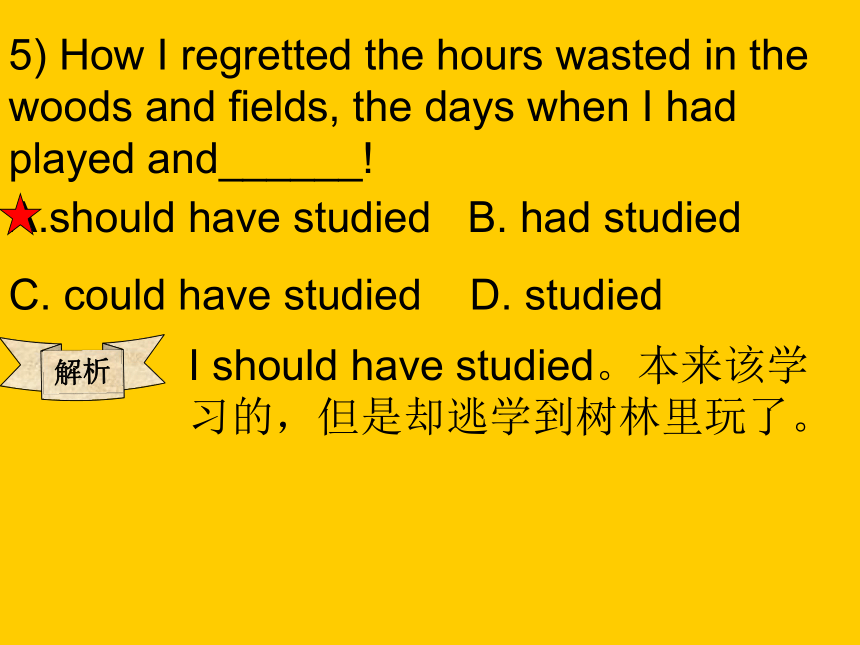
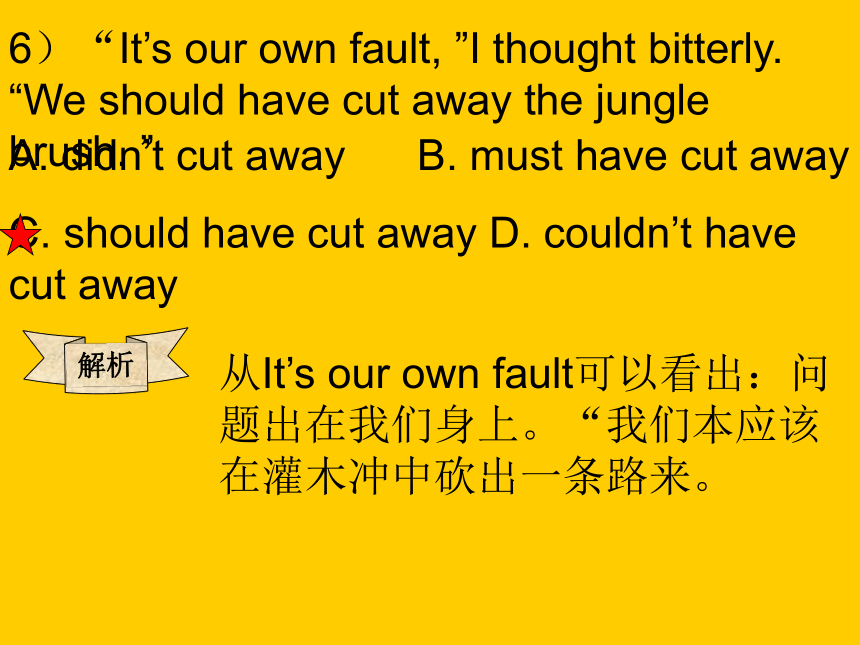
文档简介
课件73张PPT。2008届英语复习语法专题
情态动词 最近几年高考试题中常常借助语境来考查情态动词的基本用法及其区别,因此在平时学习时准确理解和掌握情态动词的基本用法十分重要。情态动词的用法复杂多变,在高考试题中,命题者常常利用语境和句子之间意义上的细微差别来考查学生对情态动词的理解和掌握。对于情态动词,除了要求考生能够准确掌握它们的基本用法外,还要充分利用高考试题所设置的语境来分析句子之间所体现的特殊关系。下面就近几年来高考试题中出现的情态动词的考点进行归纳分析,以便同学们复习掌握。一、用“情态动词+have +done”结构表示对过去动作的推测,高考试题中常用过去时态或过去的时间状语给以暗示。情态动词的这一用法可以用 “对立统一”来概括。
1.当试题的前句和后句在动作和意义上相互补充说明,且整个句意在动作和时间上是一个整体时,我们可用“统一”关系来解决这样的试题。常见的结构有: must have done: 表示对过去动作的肯定推测,常译作“一定做了……”,只能用于肯定句中。其否定形式为can’t/couldn’t have done? 疑问式为Can/Could...have done﹖。
could /might have done:表示对过去发生的动作的可能性推测,常译作“可能做了……”。如: 1) Sorry I’m late. I _____ have turned off the alarm clock and gone back to sleep again. ?(北京 2000春) A. might B. should C. can D. will 该题前句说明了结果,后句接着说出了产生这种结果的可能性,对前句进行补充说明。分析选项可知本题应选A。2) My sister met him at the Grand Theater yesterday afternoon, so he _____ your lecture. ?(上海 2000) A. couldn’t have attended B. needn’t have attended C. mustn’t have attended D. shouldn’t have attended 该题前句叙说一个客观事实,后句对前句进行补充说明,分析选项可知C是错误的? 而B、D两项不符合题意。故本题选A。 Jack ____ yet, otherwise he would have telephoned me. (上海’06) A. mustn’t have arrived B. shouldn’t have arrived C. can’t have arrived D. need not have arrivedcan’t have arrived 表示强烈的否定的猜测。语气较弱时用couldn’t have done or might not have done or may not have done .2.当试题的前后句在动作和意义上构成转折关系时,常借助“but, however, instead”等词来表示过去的动作与客观事实不符,这时我们就可以用“对立”关系来解决这样的试题。这种结构常见的有:should have done / ought to have done:表示过去本应该做某事而实际上没有做。 should not have done / ought not to have done:表示过去本不应该做某事但事实上却做了。need not have done:表示过去本来没有必要做某事,但事实上却做了。3) I was really anxious about you. You ____ home without a word. (NMET2001)A. mustn’t leave B. shouldn’t have left C. couldn’t have left D. needn’t leave 分析该题前后句之间的关系和语气可知,事实上是 “本不应该离家出走却走了”,故本题选B。4) I told Sally how to get here, but perhaps I _____ for her. (NMET’04) A. had to write it out B. must have written it out C. should have written it out D. ought to write it out由句中的连词but可知前后句之间是对立关系,分析题意可知本题应选C。5) How I regretted the hours wasted in the woods and fields, the days when I had played and______! should have studied B. had studied
C. could have studied D. studiedI should have studied。本来该学习的,但是却逃学到树林里玩了。6)“It’s our own fault, ”I thought bitterly. “We should have cut away the jungle brush. ” A. didn’t cut away B. must have cut away
C. should have cut away D. couldn’t have cut away从It’s our own fault可以看出:问题出在我们身上。“我们本应该在灌木冲中砍出一条路来。二、考查情态动词基本用法之间的比较和辨析。最近几年高考试题中常借助具体的语境来考查考生对那些最常见的情态动词的基本用法的理解和掌握,因此在做这样的试题时应认真分析语境中所含的实际意义,并结合情态动词的基本含义和用法做出正确的选择。1. —Is John coming by train﹖ —He should, but he ______ not. He likes driving his car. (NMET2002) A. must B. can C. need D. maymustn’t 表示“禁止、不准”;cannot 表示“不可能”;need not 表示“不必要”;may not 表示“可能不”。分析语境可知本题应选D。2) —I hear you’ve got a set of valuable Australian coins. ______ I have a look﹖ —Yes, certainly. (北京2005春) A. Do B. May C. Shall D. Should 分析语境可知这是在征求对方的许可,may表示“允许、可以”,语气比较委婉? shall常用于第一、三人称作主语的疑问句中,表示征求对方意见和指示,如果此空用shall,则意为“要(我)看一下吗?”,不符合上下文意思。故本题选B。 3) Mr Bush is on time for everything. How ____ it be that he was late for the opening ceremony﹖ (上海2001春)
A. can B. should C. may D. must must be 表示肯定的猜测,只能用于肯定句中,由题意可知本题应选A。 4) —Are you coming to Jeff’s party﹖ —I’m not sure. I ____ go to the concert instead. (NMET2000) A. must B. would C. should D. might 由题意和下句中的 “I’m not sure” 可知这段对话中存在一种可能性推测,might可以用来表示一种比较委婉的可能性判断,故本题选D。 5)I should have been there, but I _____ not find the time. (上海2000春) A. would B. could C. might D. should 分析题意可知第二个分句表示过去的某种能力;C 项只表示语气上的可能性,与题意不符。故本题选B。 6) Johnny, you ____ play with the knife, you ____ hurt yourself. (NMET’96) A. won’t; can’t B. mustn’t; may C. shouldn’t; must D. can’t; shouldn’t mustn’t 表示“不可以;禁止”,分析题意可知第二个空表示某种可能性,故本题选B。 7) —Will you stay for lunch﹖ —Sorry, ______. My brother is coming to see me. (NMET’99) A. I mustn’t B. I can’t C. I needn’t D. I won’t 分析题意可知因为“我弟弟要来看我”,所以“不能留下”,因此对别人的邀请或要求应给予礼貌的拒绝。A 项表示“禁止”;C项表示“不必要”;而D项表示“不会”,均不符合题意。故本题选B。 8)—When can I come for the photos﹖ I need them tomorrow afternoon. —They _____ be ready by 12?00. (NMET’98) A. can B. should C. might D. need 该题考查情态动词should的基本含义,表示揣测,表示可能或期望,意思是"照理说来、应该"。分析句意可知本题应选B。
He should be having class now.他现在应该是在上课。
As far as I know you shouldn't have any problems there.就我所知,在那里你不会遇到任何问题。
According to the schedule, they should have arrived in Shanghai by now/ yesterday.按照计划,他们现在/昨天应该已经到达上海了吧。又如:9) The fire spread through the hotel very quickly but everyone ____ get out.(NMET’97) A. had to B. would C. could D. was able to该题考查了could和be able to的区别,二者都可表示过去时间的能力,但如果表示过去成功地做了某事只能使用was / were able to do,故本题选D。Though, at first, Byrd and his men were able to take a great many photographs of the mountains that lay below, they soon ran into serious trouble.
The plane was then able to rise and it cleared the mountains by 400 feet.
Byrd now knew that he would be able to reach the South Pole which was 300 miles away.
The aircraft was able to fly over the endless white plains without difficulty.又如:10) —Shall I tell John about it ﹖ —No, you _____. I’ve told him already. (NMET’94) A. needn’t B. wouldn’t C. mustn’t D. shouldn’t 情态动词shall在试题中表示征询对方意见或请求指示。答句暗示 “没有必要了”,故本题选A。
—I promise her daughter ____ get a nice present on her birthday.
—Will it be a big surprise to her?
A. should B. must C. would D. shallshall表示”允诺”,根据讲话人语气可以知道,选项部分表示讲话是给对方的一种承诺,故应该选情态动词shall用于第二或第三人称用作主语的句子结构中。答案D。 Just as we were sitting down to have dinner, the telephone ____ ring.
A. must B. could C. might D. need解答该题的关键是要准确把握情态动词must的特殊意义在语境中的用法。must 在此表示说话人的愿望或感到不耐烦,意思为"偏要"。句子意思为:正当我们要坐下来吃饭时,偏偏电话铃响了。其它选项无此意义,答案A。Mrs Smith, I will fetch ten chairs for the meeting.
—You ____fetch ten; six will do.
A. may not B. mustn’t C. needn’t D. can’tmay not"不可以",表示允许; mustn’t"一定不",表禁止; needn’t"没必要",表示一种建议;can’t"不能",表示某种可能性。根据说话人语气,应选needn’t。答案C。You ____ pay too much attention to your reading skill, as it is so important.
A. can’t B. should C. must D. needn’t解答该题的关键是对can’t...too...to固定短语的理解。根据句子意义:无论怎么注意你的阅读技巧都不过分。同时句中由于有了too...to结构,只有can’t 可以与它构成固定短语,有此含义。其它选项无此意。答案A。情态动词用法小结一、表示"可能"或"预测" can,could,will,would,shall,should,must,ought to1.can 和 could 用于表示"可能"或"预测":He can‘t be at home. (否定句)
他不可能在家。 2) Can the news be true ? (将情态动词 can 置于主语 the news 前就成疑问句)
这消息可能是真的吗?3) Anybody can make mistake. (只表示理论上的可能性) 任何人都可能犯错误。
4) At that time we thought the story could not be true. (表示过去的可能性)
那时我们认为所说的故事不可能是真的。 5) An accident can happen if you do this. (表示事情肯定会发生) 如果你这样做,可能会发生意外。 2. may 和 might 用于表示"事实上的可能性"或"预测": 1)It may rain tomorrow. (表示可能会发生) 明天可能会下雨。 2)It may snow later this afternoon. (表示预测) 今天下午可能会下雪。 3)You might be right. (表示有可能) 你可能是对的。6)If you took some exercise, you might not be so fat. (might 用于条件句) 要是你锻炼锻炼,可能不会这样胖。 4)It is possible he may have called while we were out. (现在完成式型may have called) 当我们出门后,他有可能会打电话来。 5)Sam might have taken the money, but it seems unlikely. (过去完成式型 might have taken) 钱可能会是Sam拿走的,但又不太像。 3. will 和 would 用于表示"预测"或"习惯性": 1)I think he will be all right now. (will be 表示一定会) 我想他现在一定好了。
2)He would come to see me when he was in London. (would 表示习惯地) 他在伦敦时,常来看望我。
3) He will sit there hour after hour looking at the river. (will 表示经常 的) 他经常一连几个小时坐在那儿看着河水。 4. must 用于表示"必定","必会": 1. This must be good for you. (must be 肯定) 这肯定对你是有益的。 2. All mankind must die. (表示必然会发生的事) 所有的人一定会死的。 3. Mustn't there be a mistake ? (mustn't 多用于疑问句) 那肯定会有错误吗? 5. ought to 用于表示"想必会"(语气较must 弱): 1)They ought to be there by now. 他们想必已到那儿了。
2) He ought to stop smoking. 他最好不要抽烟了。
二、表示"许可"、"请求" (Can, Could, Will, Would, Shall, Should, May, Might, Must) 1 can 和 could 用于表示"许可"、"请求": 1) Can I go with you ? (请求) 我能跟你一起走吗? 2) Father said I could go to cinema. (表示过去的许可) 爸爸说我可以去看电影。 3) Could I ask you something ? (请求,用 could 比 can 更婉转) 我可以问你一件事吗?
4) Can't you do it now ? (表示反问) 你不能现在做吗?
5. You cannot smoke in the meeting room. (cannot 表示"禁止") 会议室里不许吸烟。2. will 和 would 用于表示"请求" Will you kindly tell me the way to the post office ? (表示客气请求) 请问到邮局怎么走?
2. Would you give me your address ? (用 would 比 will 表示更客气) 请你告诉我你的地址,好吗? 3. shall 和 should 用于第一人称,表示征求对方的意见 Shall we talk? 我们谈谈好吗?
2) What should we do next ? (用should 比 shall 表示更客气) 下一步我们该怎么做?
3) Shall he come to see you ? (用于第三人称疑问句) 要不要他来看你? 4. may 和 might 用于表示"许可"(口语中多用 can ) You may take a walk. (表示给予许可) 你可以散散步。
2) You might read the story for me. (比may更婉转) 是否请给我读一读这故事。
3) May I make a suggestion ? 我可以提个建议吗? 4) Might I take a look of your work ? 我看看您的大作行吗?
5) Students may not make noise in the library. (may not 表示不许可或禁止) 学生不得在图书馆里吵闹。
6) If I may say so, you are not right. (用于条件句,表示请求) 你是不对的,如果我可以这么说的话。 5. must 用于表示"禁止","不准": Cars must not be parked here. (must not表示不许可) 此地不准停车。
2) All of you mustn't fishing in the pool. (must not 语气方面比 may not 更 强) 你们不准在池里钓鱼。 三、情态动词的用法:表示“应该”、“必须” (Shall, Should, May, Might, Must, Ought to) 1. Shall 和 Should 用于表示“必须”: Each member shall wear a name card. (表示规定) 每一个会员必须配带名卡。
2) I should answer his letter as soon as possible. (表示应该) 我应该尽快给他回信。 3) You shouldn‘t judge a man always by the clothes. (shouldn’t “不应该”含 有劝告的意思) 你不应该总是以貌取人。
4) The rules shall take effect on Jan. 1st. (shall 用于规章等,表示义务和 规定) 新规则于一月一日起生效。 2. May 和 Might 用于表示“应该"(用于法律等条文,一般上多用 shall ): Payment may be paid by check. (表示规定) 应以支票付款。
2) You might ask before you use my computer. (might表示应该) 你应该先问过再使用我的电脑。 3. Must 用于表示“必须”、“务必”: 1) You must keep the place clean. (务必) 你务必保持地方干净。
2) We must obey orders. (表示有义务) 我们必须服从命令。
3) Must I pay now ? (用于疑问句) (如回答不必时,需用 needn't 或 don't have to) 我现在就得付款吗? 4. Ought to 用于表示“应该”(强调客观上):(大多情况可用 should 代替) 1) You ought to go to see the doctor. (ought to 的语气比must 弱) 你应该去看看医生。
2) You oughtn‘t (ought not) to smoke so much. (oughtn’t 用于否定句) 你不应该抽这么多烟。
3) Ought you to smoke so much? (用于疑问句) 你应该抽这么多烟吗?四、情态动词的用法:表示“意图”、“打算” (will, would, shall, should) 1.will 和 would 用于表示某种意图: 1) I‘ll will call you as soon as possible. (will 主要用于第一人称) 我会尽快打电话给你。
2) Will you accept this invitation ? (用would 则表示得客气) 你愿意接受这邀请吗?3. Who will do the job ? (用于条件句,可用于各种人称)
谁愿意做这事?
4. We won't (will not) stay here too long. (will not 表示不愿)
我们不愿呆在这里太久。 2. shall 和 should 用于表示说话人的意图: 1) We shan‘t (shall not) to if it rains. (shall not 也可用 will not)
如果下雨,我们就不打算走了。
2) I shan‘t go with you. (shall 只用在第一人称)
我不打算和你一同走。 五、情态动词的用法:表示“意愿” (will, would, shall, should)1. will 和 would : She will do it if you ask her. (表示主语的意愿) 如果你问她,她会做的。
Would you have another cup of tea ? (用 would 比 will 客气) 你想再来一杯茶吗? 3. Will you have some cookies ? (will 用于疑问句,表示问人是否愿意) 你想吃些烤饼吗?
4. If he will he can do it. (will 用于条件句,用于第二、三人称) 如果他愿意,他会做的。
5. Would you excuse me ? (would 表示婉转语气) 你能原谅我吗?六、情态动词的用法:表示“决心” (will, would, shall, would)1. will 和 would : 1) I will stop smoking. (will 表示主语 I 的决心。不能用 I‘ll) 我决心戒烟了。
2) If you will go, you may go at once. (用于条件句,用于第二、三人称) 如果你非走不可,你可以马上就走。能力提升1. "Whatever you want, you have it on condition that you get the best result." said the boss.
would B. ought to C. shall D. could
2. —What's wrong with your pen.'?
—The ink ____come out.
A. can't B. doesn't C. hasn't D. won' t3. —Will you stay here for supper, Jane?
—Sorry, I ____. My parents are waiting for me at home.
A, can't B. needn't C. mustn't D. won't4. —It rained so heavily that I had no choice but to stay at home.
—Anybody in your position____. the same.
A. does B. will do C. has done D. would have done5. —It is said that China will soon be a member of WTO.
—Well, it's wonderful that the Chinese people ___have made so much progress these years.
A. must B. can C. should D. may6. They didn't want to come with us at first, but then we ____ persuade them.
would B. could C. were able to D. had to
7. She the hospital so soon, for she has not yet recovered.
A. wouldn't have left B. shouldn't have left
C. mustn't have left D. didn't have to leave7. Considering that Tom always did well in all his subjects, he in the final exam.
A. mustn't fail B. couldn't have failed
C. ought not to fail D. mustn't have failed
8. —Shall I go and buy two more bottles of beer?
—No, I've already bought twenty. That be enough for us two.
A. ought to B. will C. may D. might9. —Tom, would you like to come to our dinner party?
— .
Yes, I would B. Yes, with pleasure C. No, I can't come D. Yes, I may
10. —Is there a flight to Paris this evening?
—There ___ be. I' 11 phone the airport and find it out.
A. must B. would C. might D. can11. —A man answered the phone. I suppose it was her husband.
—It ___ her husband. He has been dead for ages.
A. mustn't be B. couldn't have been
C. may not have been D. mustn't have been
12. —I didn't go to work yesterday afternoon because my car broke down.
—You mine. I wasn't using it.
A. might borrow B. could have borrowed
C. can have borrowed D. ought to borrow13. —I wonder if I smoke here.
—No, you. Could you see the sign "No Smoking" there?
can, needn't B. shall, won’t
C. must, can't D. may, mustn't
14. There are only eight photos here. I twenty-two.
A. ought to have been B. ought to be
C. ought to have D. ought to have had15. He was taken away by the police. He for a robber.
A. must be mistaken B. was being mistaken
C. must mistake D. must have been mistaken
16. —I wonder why Mr. Wang didn't attend the lecture.
—He another one.
A. could have B. must have C. might have had D. should have had17. —Shall I book a table for the dinner?
—___. The restaurant won't be full this evening.
A. Yes, you may B. No, you mustn't
C. No, you needn't D. No, you can't
18. English is a language that many people around the world ___not speak perfectly but at least understand.
A. may, can B. would, might C. will, must D. could, might19. —You must phone us every week.
—Yes, I .
must B. have to C. will D. should
20. —Did you visit the famous museum?
—No, we ___, but we spent too much time shopping.
A. could have B. must have visited
C. didn’t have time D. shouldn't 21. The line is busy. Someone _ __ the telephone.
A. may be using B. may have used
C. must have been using D. must be using
22. —Where shall we meet tomorrow?
—Well. I ___come to your house if you like.
A. could B. might C. should D. would23. —Why ___it rain now? I ___go to the concert at 7.
—What a pity!
can, might not B. should, needn't
C. must, can't D. need, mustn't
24. You phone him if you want to, but you. He'll surely phone you.
may, mustn't B. have to, needn't
C. might, won't D. can, needn't25. —Jones is in hospital.
—Oh really? . visit her.
A. didn't know, I'll go and B. don' t know, I' 11 go and
C. didn't know, I' m going to D. haven' t known, I' m going to26. —You know that you were driving 100 km. an hour, don't you?
—No officer, I . This car doesn't do more than 80.
A. may not have been B. couldn't have been
C. mustn't have been D. shouldn't have been27. At the press conference , a news reporter asked the chairman if she ___ trouble him with a question about Taiwan issue.
might B. should C. would D. had to
28. As an auto repairman , Dick ___know what is wrong with the car .
A. ought to B. must C. should D. could 29. Even if you ___ do it, I ___ allow you to because it's too dangerous .
have to /can’t B. dare/won’t
C. can/ shouldn’t D. will/mustn’t
30.I ___ make this computer work even if I ___ stay up all night.
can/might B. may/ will
C. will/have to D. must/can31. We ____ the Fast Reading materials before we do it in class .
needn’t have read B. can’t have read
C. don’t have to read D. needn’t read
情态动词 最近几年高考试题中常常借助语境来考查情态动词的基本用法及其区别,因此在平时学习时准确理解和掌握情态动词的基本用法十分重要。情态动词的用法复杂多变,在高考试题中,命题者常常利用语境和句子之间意义上的细微差别来考查学生对情态动词的理解和掌握。对于情态动词,除了要求考生能够准确掌握它们的基本用法外,还要充分利用高考试题所设置的语境来分析句子之间所体现的特殊关系。下面就近几年来高考试题中出现的情态动词的考点进行归纳分析,以便同学们复习掌握。一、用“情态动词+have +done”结构表示对过去动作的推测,高考试题中常用过去时态或过去的时间状语给以暗示。情态动词的这一用法可以用 “对立统一”来概括。
1.当试题的前句和后句在动作和意义上相互补充说明,且整个句意在动作和时间上是一个整体时,我们可用“统一”关系来解决这样的试题。常见的结构有: must have done: 表示对过去动作的肯定推测,常译作“一定做了……”,只能用于肯定句中。其否定形式为can’t/couldn’t have done? 疑问式为Can/Could...have done﹖。
could /might have done:表示对过去发生的动作的可能性推测,常译作“可能做了……”。如: 1) Sorry I’m late. I _____ have turned off the alarm clock and gone back to sleep again. ?(北京 2000春) A. might B. should C. can D. will 该题前句说明了结果,后句接着说出了产生这种结果的可能性,对前句进行补充说明。分析选项可知本题应选A。2) My sister met him at the Grand Theater yesterday afternoon, so he _____ your lecture. ?(上海 2000) A. couldn’t have attended B. needn’t have attended C. mustn’t have attended D. shouldn’t have attended 该题前句叙说一个客观事实,后句对前句进行补充说明,分析选项可知C是错误的? 而B、D两项不符合题意。故本题选A。 Jack ____ yet, otherwise he would have telephoned me. (上海’06) A. mustn’t have arrived B. shouldn’t have arrived C. can’t have arrived D. need not have arrivedcan’t have arrived 表示强烈的否定的猜测。语气较弱时用couldn’t have done or might not have done or may not have done .2.当试题的前后句在动作和意义上构成转折关系时,常借助“but, however, instead”等词来表示过去的动作与客观事实不符,这时我们就可以用“对立”关系来解决这样的试题。这种结构常见的有:should have done / ought to have done:表示过去本应该做某事而实际上没有做。 should not have done / ought not to have done:表示过去本不应该做某事但事实上却做了。need not have done:表示过去本来没有必要做某事,但事实上却做了。3) I was really anxious about you. You ____ home without a word. (NMET2001)A. mustn’t leave B. shouldn’t have left C. couldn’t have left D. needn’t leave 分析该题前后句之间的关系和语气可知,事实上是 “本不应该离家出走却走了”,故本题选B。4) I told Sally how to get here, but perhaps I _____ for her. (NMET’04) A. had to write it out B. must have written it out C. should have written it out D. ought to write it out由句中的连词but可知前后句之间是对立关系,分析题意可知本题应选C。5) How I regretted the hours wasted in the woods and fields, the days when I had played and______! should have studied B. had studied
C. could have studied D. studiedI should have studied。本来该学习的,但是却逃学到树林里玩了。6)“It’s our own fault, ”I thought bitterly. “We should have cut away the jungle brush. ” A. didn’t cut away B. must have cut away
C. should have cut away D. couldn’t have cut away从It’s our own fault可以看出:问题出在我们身上。“我们本应该在灌木冲中砍出一条路来。二、考查情态动词基本用法之间的比较和辨析。最近几年高考试题中常借助具体的语境来考查考生对那些最常见的情态动词的基本用法的理解和掌握,因此在做这样的试题时应认真分析语境中所含的实际意义,并结合情态动词的基本含义和用法做出正确的选择。1. —Is John coming by train﹖ —He should, but he ______ not. He likes driving his car. (NMET2002) A. must B. can C. need D. maymustn’t 表示“禁止、不准”;cannot 表示“不可能”;need not 表示“不必要”;may not 表示“可能不”。分析语境可知本题应选D。2) —I hear you’ve got a set of valuable Australian coins. ______ I have a look﹖ —Yes, certainly. (北京2005春) A. Do B. May C. Shall D. Should 分析语境可知这是在征求对方的许可,may表示“允许、可以”,语气比较委婉? shall常用于第一、三人称作主语的疑问句中,表示征求对方意见和指示,如果此空用shall,则意为“要(我)看一下吗?”,不符合上下文意思。故本题选B。 3) Mr Bush is on time for everything. How ____ it be that he was late for the opening ceremony﹖ (上海2001春)
A. can B. should C. may D. must must be 表示肯定的猜测,只能用于肯定句中,由题意可知本题应选A。 4) —Are you coming to Jeff’s party﹖ —I’m not sure. I ____ go to the concert instead. (NMET2000) A. must B. would C. should D. might 由题意和下句中的 “I’m not sure” 可知这段对话中存在一种可能性推测,might可以用来表示一种比较委婉的可能性判断,故本题选D。 5)I should have been there, but I _____ not find the time. (上海2000春) A. would B. could C. might D. should 分析题意可知第二个分句表示过去的某种能力;C 项只表示语气上的可能性,与题意不符。故本题选B。 6) Johnny, you ____ play with the knife, you ____ hurt yourself. (NMET’96) A. won’t; can’t B. mustn’t; may C. shouldn’t; must D. can’t; shouldn’t mustn’t 表示“不可以;禁止”,分析题意可知第二个空表示某种可能性,故本题选B。 7) —Will you stay for lunch﹖ —Sorry, ______. My brother is coming to see me. (NMET’99) A. I mustn’t B. I can’t C. I needn’t D. I won’t 分析题意可知因为“我弟弟要来看我”,所以“不能留下”,因此对别人的邀请或要求应给予礼貌的拒绝。A 项表示“禁止”;C项表示“不必要”;而D项表示“不会”,均不符合题意。故本题选B。 8)—When can I come for the photos﹖ I need them tomorrow afternoon. —They _____ be ready by 12?00. (NMET’98) A. can B. should C. might D. need 该题考查情态动词should的基本含义,表示揣测,表示可能或期望,意思是"照理说来、应该"。分析句意可知本题应选B。
He should be having class now.他现在应该是在上课。
As far as I know you shouldn't have any problems there.就我所知,在那里你不会遇到任何问题。
According to the schedule, they should have arrived in Shanghai by now/ yesterday.按照计划,他们现在/昨天应该已经到达上海了吧。又如:9) The fire spread through the hotel very quickly but everyone ____ get out.(NMET’97) A. had to B. would C. could D. was able to该题考查了could和be able to的区别,二者都可表示过去时间的能力,但如果表示过去成功地做了某事只能使用was / were able to do,故本题选D。Though, at first, Byrd and his men were able to take a great many photographs of the mountains that lay below, they soon ran into serious trouble.
The plane was then able to rise and it cleared the mountains by 400 feet.
Byrd now knew that he would be able to reach the South Pole which was 300 miles away.
The aircraft was able to fly over the endless white plains without difficulty.又如:10) —Shall I tell John about it ﹖ —No, you _____. I’ve told him already. (NMET’94) A. needn’t B. wouldn’t C. mustn’t D. shouldn’t 情态动词shall在试题中表示征询对方意见或请求指示。答句暗示 “没有必要了”,故本题选A。
—I promise her daughter ____ get a nice present on her birthday.
—Will it be a big surprise to her?
A. should B. must C. would D. shallshall表示”允诺”,根据讲话人语气可以知道,选项部分表示讲话是给对方的一种承诺,故应该选情态动词shall用于第二或第三人称用作主语的句子结构中。答案D。 Just as we were sitting down to have dinner, the telephone ____ ring.
A. must B. could C. might D. need解答该题的关键是要准确把握情态动词must的特殊意义在语境中的用法。must 在此表示说话人的愿望或感到不耐烦,意思为"偏要"。句子意思为:正当我们要坐下来吃饭时,偏偏电话铃响了。其它选项无此意义,答案A。Mrs Smith, I will fetch ten chairs for the meeting.
—You ____fetch ten; six will do.
A. may not B. mustn’t C. needn’t D. can’tmay not"不可以",表示允许; mustn’t"一定不",表禁止; needn’t"没必要",表示一种建议;can’t"不能",表示某种可能性。根据说话人语气,应选needn’t。答案C。You ____ pay too much attention to your reading skill, as it is so important.
A. can’t B. should C. must D. needn’t解答该题的关键是对can’t...too...to固定短语的理解。根据句子意义:无论怎么注意你的阅读技巧都不过分。同时句中由于有了too...to结构,只有can’t 可以与它构成固定短语,有此含义。其它选项无此意。答案A。情态动词用法小结一、表示"可能"或"预测" can,could,will,would,shall,should,must,ought to1.can 和 could 用于表示"可能"或"预测":He can‘t be at home. (否定句)
他不可能在家。 2) Can the news be true ? (将情态动词 can 置于主语 the news 前就成疑问句)
这消息可能是真的吗?3) Anybody can make mistake. (只表示理论上的可能性) 任何人都可能犯错误。
4) At that time we thought the story could not be true. (表示过去的可能性)
那时我们认为所说的故事不可能是真的。 5) An accident can happen if you do this. (表示事情肯定会发生) 如果你这样做,可能会发生意外。 2. may 和 might 用于表示"事实上的可能性"或"预测": 1)It may rain tomorrow. (表示可能会发生) 明天可能会下雨。 2)It may snow later this afternoon. (表示预测) 今天下午可能会下雪。 3)You might be right. (表示有可能) 你可能是对的。6)If you took some exercise, you might not be so fat. (might 用于条件句) 要是你锻炼锻炼,可能不会这样胖。 4)It is possible he may have called while we were out. (现在完成式型may have called) 当我们出门后,他有可能会打电话来。 5)Sam might have taken the money, but it seems unlikely. (过去完成式型 might have taken) 钱可能会是Sam拿走的,但又不太像。 3. will 和 would 用于表示"预测"或"习惯性": 1)I think he will be all right now. (will be 表示一定会) 我想他现在一定好了。
2)He would come to see me when he was in London. (would 表示习惯地) 他在伦敦时,常来看望我。
3) He will sit there hour after hour looking at the river. (will 表示经常 的) 他经常一连几个小时坐在那儿看着河水。 4. must 用于表示"必定","必会": 1. This must be good for you. (must be 肯定) 这肯定对你是有益的。 2. All mankind must die. (表示必然会发生的事) 所有的人一定会死的。 3. Mustn't there be a mistake ? (mustn't 多用于疑问句) 那肯定会有错误吗? 5. ought to 用于表示"想必会"(语气较must 弱): 1)They ought to be there by now. 他们想必已到那儿了。
2) He ought to stop smoking. 他最好不要抽烟了。
二、表示"许可"、"请求" (Can, Could, Will, Would, Shall, Should, May, Might, Must) 1 can 和 could 用于表示"许可"、"请求": 1) Can I go with you ? (请求) 我能跟你一起走吗? 2) Father said I could go to cinema. (表示过去的许可) 爸爸说我可以去看电影。 3) Could I ask you something ? (请求,用 could 比 can 更婉转) 我可以问你一件事吗?
4) Can't you do it now ? (表示反问) 你不能现在做吗?
5. You cannot smoke in the meeting room. (cannot 表示"禁止") 会议室里不许吸烟。2. will 和 would 用于表示"请求" Will you kindly tell me the way to the post office ? (表示客气请求) 请问到邮局怎么走?
2. Would you give me your address ? (用 would 比 will 表示更客气) 请你告诉我你的地址,好吗? 3. shall 和 should 用于第一人称,表示征求对方的意见 Shall we talk? 我们谈谈好吗?
2) What should we do next ? (用should 比 shall 表示更客气) 下一步我们该怎么做?
3) Shall he come to see you ? (用于第三人称疑问句) 要不要他来看你? 4. may 和 might 用于表示"许可"(口语中多用 can ) You may take a walk. (表示给予许可) 你可以散散步。
2) You might read the story for me. (比may更婉转) 是否请给我读一读这故事。
3) May I make a suggestion ? 我可以提个建议吗? 4) Might I take a look of your work ? 我看看您的大作行吗?
5) Students may not make noise in the library. (may not 表示不许可或禁止) 学生不得在图书馆里吵闹。
6) If I may say so, you are not right. (用于条件句,表示请求) 你是不对的,如果我可以这么说的话。 5. must 用于表示"禁止","不准": Cars must not be parked here. (must not表示不许可) 此地不准停车。
2) All of you mustn't fishing in the pool. (must not 语气方面比 may not 更 强) 你们不准在池里钓鱼。 三、情态动词的用法:表示“应该”、“必须” (Shall, Should, May, Might, Must, Ought to) 1. Shall 和 Should 用于表示“必须”: Each member shall wear a name card. (表示规定) 每一个会员必须配带名卡。
2) I should answer his letter as soon as possible. (表示应该) 我应该尽快给他回信。 3) You shouldn‘t judge a man always by the clothes. (shouldn’t “不应该”含 有劝告的意思) 你不应该总是以貌取人。
4) The rules shall take effect on Jan. 1st. (shall 用于规章等,表示义务和 规定) 新规则于一月一日起生效。 2. May 和 Might 用于表示“应该"(用于法律等条文,一般上多用 shall ): Payment may be paid by check. (表示规定) 应以支票付款。
2) You might ask before you use my computer. (might表示应该) 你应该先问过再使用我的电脑。 3. Must 用于表示“必须”、“务必”: 1) You must keep the place clean. (务必) 你务必保持地方干净。
2) We must obey orders. (表示有义务) 我们必须服从命令。
3) Must I pay now ? (用于疑问句) (如回答不必时,需用 needn't 或 don't have to) 我现在就得付款吗? 4. Ought to 用于表示“应该”(强调客观上):(大多情况可用 should 代替) 1) You ought to go to see the doctor. (ought to 的语气比must 弱) 你应该去看看医生。
2) You oughtn‘t (ought not) to smoke so much. (oughtn’t 用于否定句) 你不应该抽这么多烟。
3) Ought you to smoke so much? (用于疑问句) 你应该抽这么多烟吗?四、情态动词的用法:表示“意图”、“打算” (will, would, shall, should) 1.will 和 would 用于表示某种意图: 1) I‘ll will call you as soon as possible. (will 主要用于第一人称) 我会尽快打电话给你。
2) Will you accept this invitation ? (用would 则表示得客气) 你愿意接受这邀请吗?3. Who will do the job ? (用于条件句,可用于各种人称)
谁愿意做这事?
4. We won't (will not) stay here too long. (will not 表示不愿)
我们不愿呆在这里太久。 2. shall 和 should 用于表示说话人的意图: 1) We shan‘t (shall not) to if it rains. (shall not 也可用 will not)
如果下雨,我们就不打算走了。
2) I shan‘t go with you. (shall 只用在第一人称)
我不打算和你一同走。 五、情态动词的用法:表示“意愿” (will, would, shall, should)1. will 和 would : She will do it if you ask her. (表示主语的意愿) 如果你问她,她会做的。
Would you have another cup of tea ? (用 would 比 will 客气) 你想再来一杯茶吗? 3. Will you have some cookies ? (will 用于疑问句,表示问人是否愿意) 你想吃些烤饼吗?
4. If he will he can do it. (will 用于条件句,用于第二、三人称) 如果他愿意,他会做的。
5. Would you excuse me ? (would 表示婉转语气) 你能原谅我吗?六、情态动词的用法:表示“决心” (will, would, shall, would)1. will 和 would : 1) I will stop smoking. (will 表示主语 I 的决心。不能用 I‘ll) 我决心戒烟了。
2) If you will go, you may go at once. (用于条件句,用于第二、三人称) 如果你非走不可,你可以马上就走。能力提升1. "Whatever you want, you have it on condition that you get the best result." said the boss.
would B. ought to C. shall D. could
2. —What's wrong with your pen.'?
—The ink ____come out.
A. can't B. doesn't C. hasn't D. won' t3. —Will you stay here for supper, Jane?
—Sorry, I ____. My parents are waiting for me at home.
A, can't B. needn't C. mustn't D. won't4. —It rained so heavily that I had no choice but to stay at home.
—Anybody in your position____. the same.
A. does B. will do C. has done D. would have done5. —It is said that China will soon be a member of WTO.
—Well, it's wonderful that the Chinese people ___have made so much progress these years.
A. must B. can C. should D. may6. They didn't want to come with us at first, but then we ____ persuade them.
would B. could C. were able to D. had to
7. She the hospital so soon, for she has not yet recovered.
A. wouldn't have left B. shouldn't have left
C. mustn't have left D. didn't have to leave7. Considering that Tom always did well in all his subjects, he in the final exam.
A. mustn't fail B. couldn't have failed
C. ought not to fail D. mustn't have failed
8. —Shall I go and buy two more bottles of beer?
—No, I've already bought twenty. That be enough for us two.
A. ought to B. will C. may D. might9. —Tom, would you like to come to our dinner party?
— .
Yes, I would B. Yes, with pleasure C. No, I can't come D. Yes, I may
10. —Is there a flight to Paris this evening?
—There ___ be. I' 11 phone the airport and find it out.
A. must B. would C. might D. can11. —A man answered the phone. I suppose it was her husband.
—It ___ her husband. He has been dead for ages.
A. mustn't be B. couldn't have been
C. may not have been D. mustn't have been
12. —I didn't go to work yesterday afternoon because my car broke down.
—You mine. I wasn't using it.
A. might borrow B. could have borrowed
C. can have borrowed D. ought to borrow13. —I wonder if I smoke here.
—No, you. Could you see the sign "No Smoking" there?
can, needn't B. shall, won’t
C. must, can't D. may, mustn't
14. There are only eight photos here. I twenty-two.
A. ought to have been B. ought to be
C. ought to have D. ought to have had15. He was taken away by the police. He for a robber.
A. must be mistaken B. was being mistaken
C. must mistake D. must have been mistaken
16. —I wonder why Mr. Wang didn't attend the lecture.
—He another one.
A. could have B. must have C. might have had D. should have had17. —Shall I book a table for the dinner?
—___. The restaurant won't be full this evening.
A. Yes, you may B. No, you mustn't
C. No, you needn't D. No, you can't
18. English is a language that many people around the world ___not speak perfectly but at least understand.
A. may, can B. would, might C. will, must D. could, might19. —You must phone us every week.
—Yes, I .
must B. have to C. will D. should
20. —Did you visit the famous museum?
—No, we ___, but we spent too much time shopping.
A. could have B. must have visited
C. didn’t have time D. shouldn't 21. The line is busy. Someone _ __ the telephone.
A. may be using B. may have used
C. must have been using D. must be using
22. —Where shall we meet tomorrow?
—Well. I ___come to your house if you like.
A. could B. might C. should D. would23. —Why ___it rain now? I ___go to the concert at 7.
—What a pity!
can, might not B. should, needn't
C. must, can't D. need, mustn't
24. You phone him if you want to, but you. He'll surely phone you.
may, mustn't B. have to, needn't
C. might, won't D. can, needn't25. —Jones is in hospital.
—Oh really? . visit her.
A. didn't know, I'll go and B. don' t know, I' 11 go and
C. didn't know, I' m going to D. haven' t known, I' m going to26. —You know that you were driving 100 km. an hour, don't you?
—No officer, I . This car doesn't do more than 80.
A. may not have been B. couldn't have been
C. mustn't have been D. shouldn't have been27. At the press conference , a news reporter asked the chairman if she ___ trouble him with a question about Taiwan issue.
might B. should C. would D. had to
28. As an auto repairman , Dick ___know what is wrong with the car .
A. ought to B. must C. should D. could 29. Even if you ___ do it, I ___ allow you to because it's too dangerous .
have to /can’t B. dare/won’t
C. can/ shouldn’t D. will/mustn’t
30.I ___ make this computer work even if I ___ stay up all night.
can/might B. may/ will
C. will/have to D. must/can31. We ____ the Fast Reading materials before we do it in class .
needn’t have read B. can’t have read
C. don’t have to read D. needn’t read
